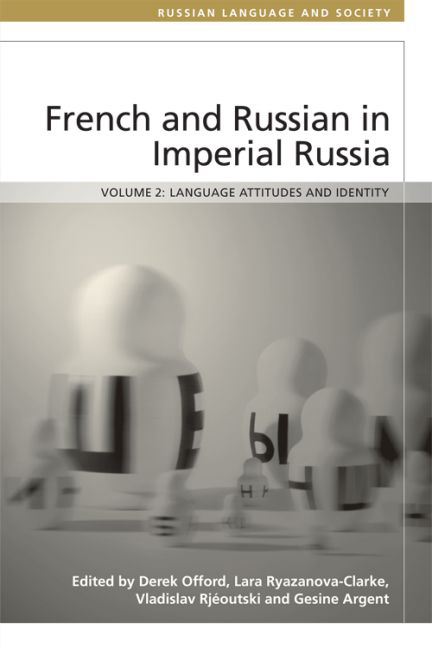Book contents
- Frontmatter
- Contents
- Preface
- Note on Dates, Transliteration and Other Editorial Practices
- Abbreviations Used in the Text, Notes and References
- Dates of Reigns in Eighteenth- and Nineteenth-Century Russia
- Dedication
- Introduction
- 1 The Pan-European Justification of a Multilingual Russian Society in the Late Eighteenth Century
- 2 Princess Dashkova and the Politics of Language in Eighteenth-Century Russia
- 3 Plating ‘Russian Gold’ with ‘French Copper’: Aleksandr Sumarokov and Eighteenth-Century Franco-Russian Translation
- 4 Francophone Culture in Russia Seen through the Russian and French Periodical Press
- 5 Linguistic Gallophobia in Russian Comedy
- 6 The Linguistic Debate between Karamzin and Shishkov: Evaluating Russian–French Language Contact
- 7 Language and Conservative Politics in Alexandrine Russia
- 8 Seduction, Subterfuge, Subversion: Ivan Krylov's Rewriting of Molière
- 9 The French Language of Fashion in Early Nineteenth-Century Russia
- 10 Russian ‘Translations’ of Patrie in the Napoleonic Period
- 11 Treatment of Francophonie in Pushkin's Prose Fiction
- 12 Love à la mode: Russian Words and French Sources
- Conclusion
- Notes on contributors
- Index
7 - Language and Conservative Politics in Alexandrine Russia
Published online by Cambridge University Press: 25 October 2017
- Frontmatter
- Contents
- Preface
- Note on Dates, Transliteration and Other Editorial Practices
- Abbreviations Used in the Text, Notes and References
- Dates of Reigns in Eighteenth- and Nineteenth-Century Russia
- Dedication
- Introduction
- 1 The Pan-European Justification of a Multilingual Russian Society in the Late Eighteenth Century
- 2 Princess Dashkova and the Politics of Language in Eighteenth-Century Russia
- 3 Plating ‘Russian Gold’ with ‘French Copper’: Aleksandr Sumarokov and Eighteenth-Century Franco-Russian Translation
- 4 Francophone Culture in Russia Seen through the Russian and French Periodical Press
- 5 Linguistic Gallophobia in Russian Comedy
- 6 The Linguistic Debate between Karamzin and Shishkov: Evaluating Russian–French Language Contact
- 7 Language and Conservative Politics in Alexandrine Russia
- 8 Seduction, Subterfuge, Subversion: Ivan Krylov's Rewriting of Molière
- 9 The French Language of Fashion in Early Nineteenth-Century Russia
- 10 Russian ‘Translations’ of Patrie in the Napoleonic Period
- 11 Treatment of Francophonie in Pushkin's Prose Fiction
- 12 Love à la mode: Russian Words and French Sources
- Conclusion
- Notes on contributors
- Index
Summary
Between 1801 and 1820, there emerged in Russia a powerful conservative movement that upheld the Russian state, the Orthodox faith and Russia's distinctive cultural identity against challenges from Napoleonic France, Western philosophy and European cosmopolitanism (Martin 1997; Al'tshuller 2007). To a remarkable degree, three leading Russian conservatives of this period – Aleksandr Shishkov (1754–1841), Fedor Rostopchin (1763–1826) and Sergei Glinka (1776–1847) – predicated their ideas of Russian nationhood on assumptions about the intrinsic worth of the Russian language as compared to the value of the French language (Institut obshchestvennoi mysli 2010: 114–17, 404–7, 588–90). Their obsessive attention to native linguistic culture and to the dangers allegedly posed to that culture by the French tongue raises the question whether the conservative nationalism of the Alexandrine era was essentially a linguistic nationalism.
Shishkov and Rostopchin were important political figures of the war era: Shishkov was a decorated naval officer who, from March 1812 to August 1814, served as the tsar's state secretary; Rostopchin, who had briefly directed the College of Foreign Affairs under Emperor Paul I, was persona non grata in Alexander's Russia until the tsar appointed him Governor-General of Moscow in 1812. Shishkov's and Rostopchin's key political writings on language and patriotism dated between 1803 and early 1812, years when their political views were unacceptable at court and when each thought of himself as a voice crying in the wilderness. Glinka, on the other hand, never held high political office. He was a literary intellectual, the co-founder with Platon Beketov of the journal Russkii vestnik (The Russian Courier). Glinka's journal had a minuscule circulation (at first there were just a hundred subscribers), but it was probably the most significant conservative journal to appear in Russia before the French invasion of 1812. After the expulsion and defeat of the French army, Glinka distinguished himself as an essayist, memoirist and historian. His Russian History (Russkaia istoriia, published 1817–19) was the first full-scale history of the Russian Empire to incorporate the Napoleonic Wars. Because Glinka's history suffered by comparison to Nikolai Karamzin's History of the Russian State (Istoriia gosudarstva Rossiiskogo, 1816–29), one of the most remarkable intellectual and literary monuments of Imperial Russia, it has been unjustly forgotten, even though it was vividly written and widely read in its day.
- Type
- Chapter
- Information
- French and Russian in Imperial RussiaLanguage Attitudes and Identity, pp. 118 - 138Publisher: Edinburgh University PressPrint publication year: 2015

